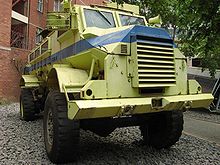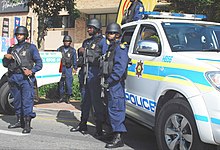South African Police Service
The South African Police Service ( SAPS , German for " South African Police Service ") has been the police force in South Africa since 1995 .
history
Before 1994, the South African Police (SAP) was integrated by the government into the system of apartheid policy and linked to tasks that corresponded to military or secret service objectives. With the end of this era and the first free elections in South Africa in 1994 , the SAP was dissolved and the police re-established as the South African Police Service . In the course of these changes, the police organizations of the ten homelands were integrated. The ranks, which were previously designated according to military ranks, such as General and Colonel , were changed to civilian names such as Commissioner (for example: "Commissioner") and Senior Superintendent (for example: "Obersuperintendent"). From then on, the SAPS was headed by the National Commissioner , to whom the Provincial Commissioners of the nine provinces of South Africa were subordinate.
In 2000 Jackie Selebi became National Commissioner. From 2004 to 2008 he also headed Interpol . He resigned from this post after being charged with corruption and other crimes. In 2010 he was sentenced to 15 years in prison. In 2010, 41,000 police officers were on duty to secure the soccer World Cup ; the World Cup was largely peaceful. In 2010 the ranks of the police officers were named like the military ranks - as they were before 1994. Since then, the National Commissioner has again held the title of General , and the Provincial Commissioners are called Lieutenant General . The inspector became the warrant officer. Selebi's successor Bheki Cele was also removed from office in 2011 for corruption. In 2011, 630 police officers were arrested, mostly in Gauteng Province . The charges were corruption and fraud , in some cases rape and murder . From June 12, 2012, Riah Phiyega was the first woman to head the South African police. In October 2015 she was suspended and replaced by Johannes Khomotso Phahlane. In 2017, Khehla John Sitole became National Commissioner .
construction

In October 2012 there were 1,146 police stations in South Africa. 156,745 police officers were employed under the South African Police Service Act and another 41,439 under the Public Service Act. There was one policeman for every 305 inhabitants. Around 70 percent of the police are male. Numerous police officers work part-time in the South African Reserve Police Service (for example: "South African Reservist Police Service ").
The headquarters of the SAPS is located in the capital Pretoria . The sections of the three Deputy National Commissioners (" Deputy National Commissioners ") and their departments (divisions) also reside there , headed by Divisional Commissioners :
- Policing with the divisions : Visible Policing, Operational Response Service, Detective Service, Inspectorate, Forensic Service, Protection & Security Service
- Resource Management with the divisions : Supply Chain Management, Financial Management, Information Technology Services, Facilities Management & Operational Infrastructure
- Corporate Service Management with the divisions : Human Resource Management, Human Resource Development, Auxiliary and Security Management, Legal & Policy Service
The SAPS Air Wing has 36 helicopters and 15 other aircraft. The SAPS Special Task Force (for example: "SAPS Response Force") is a special unit that was founded in 1976 as a Special Task Force of SAP. Its members are militarily trained and were responsible for numerous crimes of the apartheid state before 1994. Women have also been admitted there since 2004.
The Directorate for Priority Crime Investigation (DCPI), also known as hawks ("hawks"), is an elite police unit. It is responsible for investigating organized and white- collar crime as well as corruption .
The Independent Oversight Directorate (ICD; for example: " Independent Oversight Directorate ") is responsible for complaints against illegal police actions . According to the ICD, there were 828 cases of police violence, including torture, from April 2008 to March 2009.
Most police officers are represented by the Police and Prisons Civil Rights Union (POPCRU; for example: " Civil Rights Union of Police Officers and Correctional Staff").
The Minister for Safety and Security is responsible for the police . A deputy minister, the Deputy Minister for Police , who is specifically responsible for the SAPS, belongs to the ministry .
National Commissioners or Generals of the SAPS
- George Fivaz : 1995-1999
- Jacob Selebi : 2000–2009 (suspended in 2008)
- Bheki Cele : 2009–2012 (suspended 2011)
- Riah Phiyega : 2012–2017 (suspended in 2015)
- Khomotso Phahlane (2015-2017, acting)
- Lesetja Mothiba (2017, acting)
- Khehla John Sitole (since 2017)
International assignments
The SAPS took part or is taking part in various international peacekeeping operations. He provided the Commissioner of the AMIS Civilian Policing Component , Anand Pillay . South Africa also provided around 100 police officers for AMIS. Again with Pillay, SAPS has been the Police Commissioner for AMISOM since 2014 .
background
South Africa continues to have a high crime rate. Many of the crimes committed are capital crimes such as murder, robbery, and rape. The highest rates were reached at the end of apartheid. The number of people murdered per 100,000 inhabitants was around 80 in 1994, compared with 36 in 2017. In Western European countries, this figure is around one. The ratio of the decline in crime in South Africa since the early 1990s corresponds to that in Europe, but on a much higher level.
Numerous firearms are in private hands. The number of private employees in security companies is around 300,000, around twice as high as the number of police forces. The number of police officers killed on duty is high; from April 1, 2009 to March 31, 2010 it was 107. In the 2017/2018 reporting year it was 28.
criticism
Amnesty International (AI) has criticized the brutality of South African police officers, including torture and killing shots, for example during demonstrations. There were also numerous deaths in police custody. Torture methods such as apparent suffocation and electric shocks were witnessed. The discriminatory treatment of refugees from Zimbabwe was also mentioned . According to AI, women who want to report rape or other sexual crimes are often turned away by the police.
Two police chiefs who acted one after the other were convicted of corruption. It was criticized that the three consecutive National Commissioners Selebi, Cele and Phiyega did not come from the police force.
On August 16, 2012, police officers shot strikers with automatic weapons during a miners' strike near Marikana . 34 miners were killed. It was the bloodiest intervention by the South African police since the Sharpeville massacre in 1960, when South African Police officers shot protesters. The fatal shots in Marikana were referred to as " massacres " in many media . In October 2015, Police Commissioner Phiyega was suspended by President Zuma for serious errors on the part of the police in connection with the incident.
literature
- Monique Marks: Transforming the Robocops: Changing Police in South Africa. University of KwaZulu-Natal Press, Scottsville 2005, ISBN 978-1-86914-043-4 .
Web links
- Official website (English)
- Diagram: Ministry and SAPS leadership ( Memento from February 13, 2014 in the Internet Archive )
Individual evidence
- ↑ report at sahistory.org.za (English), accessed on November 5, 2012
- ^ World Cup 2010: South Africa leaves a World Cup legacy to remember. In: The Guardian on July 12, 2010 , accessed November 7, 2012
- ↑ Ranking and badge since 2010 ( Memento from March 5, 2012 in the Internet Archive ) (English; PDF; 883 kB), accessed on November 3, 2012
- ↑ Eric Conway-Smith: South Africa troubled by corrupt cops. In: GlobalPost on May 10, 2012 , accessed on November 6, 2012
- ^ A b Zuma suspends police commissioner Riah Phiyega. lestimes.com of October 14, 2015
- ↑ SAPS statistics 2012 ( Memento from December 21, 2012 in the Internet Archive ) (English), accessed on November 5, 2012
- ↑ Structure of the SAPS leadership with divisions , accessed on February 16, 2016
- ^ Ajay Gupta left South Africa on Dubai-bound flight on Feb. 6: airport. reuters.com from February 16, 2018 (English), accessed on February 16, 2018
- ↑ a b c Amnesty International 2009 report on the human rights situation in South Africa , accessed on November 6, 2012
- ↑ Information website of the POPCRU (English), accessed on February 16, 2016
- ↑ Diagram: Ministry and SAPS leadership ( memento of February 13, 2014 in the Internet Archive ) (English), accessed on November 5, 2012
- ^ Deployment of South African police service members to Darfur, Sudan. January 24, 2005, accessed June 25, 2017 .
- ↑ United Nations Office on Drugs and Crime: Global Study on Homicide 2019 (Vienna, 2019), Homicide trends, patterns and criminal justice response / Booklet 2. pp. 25,26 , accessed on August 11, 2019 (English).
- ↑ Report at assafrica.org (English, PDF file; 27 kB), accessed on November 7, 2012
- ↑ SAPS Annual Report 2009/2010 (English, PDF; 552 kB), accessed on February 16, 2016
- ^ South Africa Police Service: Crime Situation in RSA - Twelve Months 01 April 2017 to 31 March 2018. P. 19 , accessed on December 25, 2019 (English).
- ↑ Urgent Action by Amnesty International , accessed November 6, 2012
- ^ Report in The Guardian on the appointment of Mangwashi Phiyega as head of SAPS , accessed on November 6, 2012
- ↑ Report at bbc.co.uk from August 27, 2012 (English), accessed on November 6, 2012

